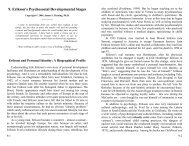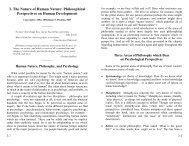7. Piaget, Kohlberg, Gilligan, and Others on Moral Development
7. Piaget, Kohlberg, Gilligan, and Others on Moral Development
7. Piaget, Kohlberg, Gilligan, and Others on Moral Development
You also want an ePaper? Increase the reach of your titles
YUMPU automatically turns print PDFs into web optimized ePapers that Google loves.
Amy’s account is more equivocal, <str<strong>on</strong>g>and</str<strong>on</strong>g> would score lower <strong>on</strong><br />
<str<strong>on</strong>g>Kohlberg</str<strong>on</strong>g>’s scale. Yet it is thoughtful, <str<strong>on</strong>g>and</str<strong>on</strong>g> it also reflects the<br />
morality of care. Asked whether Heinz should steal the drug she<br />
replied:<br />
7-17<br />
Well, I d<strong>on</strong>’t think so. I think there might be other ways besides<br />
stealing it, like if he could borrow the m<strong>on</strong>ey or make a loan or<br />
something, but he really shouldn’t steal the drug – but his wife<br />
shouldn’t die either (p. 28).<br />
<str<strong>on</strong>g>Gilligan</str<strong>on</strong>g> was careful to make the point that Amy <str<strong>on</strong>g>and</str<strong>on</strong>g> Jake do<br />
not fit stereotypical girl-boy molds either: Amy wanted to be a<br />
scientist, Jake an English teacher.<br />
What the Research Shows<br />
Comm<strong>on</strong> sense or everyday experience might suggest that<br />
there really are differences in the ways men <str<strong>on</strong>g>and</str<strong>on</strong>g> boys as compared<br />
to women <str<strong>on</strong>g>and</str<strong>on</strong>g> girls approach morality with regard to their relative<br />
weightings of justice versus care. But so-called comm<strong>on</strong> sense <str<strong>on</strong>g>and</str<strong>on</strong>g><br />
ordinary experience can also lead to mispercepti<strong>on</strong>s <str<strong>on</strong>g>and</str<strong>on</strong>g><br />
stereotyping. So the real questi<strong>on</strong> is: what does the actual research<br />
show?<br />
The picture here is not exactly crystal clear; it is mixed, <str<strong>on</strong>g>and</str<strong>on</strong>g> the<br />
hypothesis that gender differences in moral underst<str<strong>on</strong>g>and</str<strong>on</strong>g>ing remains<br />
questi<strong>on</strong>able, with some studies suggesting that such gender<br />
differences do exist; but most studies do not, <str<strong>on</strong>g>and</str<strong>on</strong>g> support for<br />
<str<strong>on</strong>g>Gilligan</str<strong>on</strong>g>’s thesis to date is weak at best (Jafee & Hyde, 2000;<br />
Turiel, 2006).<br />
<str<strong>on</strong>g>Gilligan</str<strong>on</strong>g> effectively used individual case studies (such as those<br />
of Amy <str<strong>on</strong>g>and</str<strong>on</strong>g> Jake) to buttress her arguments, al<strong>on</strong>g with a<br />
smattering of cultural “comm<strong>on</strong> sense” beliefs about the relative<br />
roles of women <str<strong>on</strong>g>and</str<strong>on</strong>g> men – al<strong>on</strong>g with limited empirical data. But<br />
further studies have, <strong>on</strong> the whole, failed to c<strong>on</strong>firm her ideas.<br />
Still, <str<strong>on</strong>g>Gilligan</str<strong>on</strong>g>’s noti<strong>on</strong>s of the morality of care versus the<br />
morality of justice may retain their cogency, <str<strong>on</strong>g>and</str<strong>on</strong>g> perhaps they do<br />
suggest that <str<strong>on</strong>g>Kohlberg</str<strong>on</strong>g> may have overlooked an important source of<br />
moral reas<strong>on</strong>ing by neglecting the ethos of care; or at least by<br />
giving it less weight than justice in his hierarchy.<br />
Perhaps the real truth is that some boys <str<strong>on</strong>g>and</str<strong>on</strong>g> men do embrace a<br />
morality of care <str<strong>on</strong>g>and</str<strong>on</strong>g> c<strong>on</strong>cern; <str<strong>on</strong>g>and</str<strong>on</strong>g> likewise, some women <str<strong>on</strong>g>and</str<strong>on</strong>g> girls<br />
are more logical <str<strong>on</strong>g>and</str<strong>on</strong>g> less sociable in their worldviews. Is <strong>on</strong>e point<br />
of view c<strong>on</strong>cerning moral judgments more advanced or civilized<br />
than the other? Are there two separate “tracts” or dimensi<strong>on</strong>s to<br />
moral reas<strong>on</strong>ing? These are indeed questi<strong>on</strong>s worth p<strong>on</strong>dering, as<br />
well as hypotheses for further research.<br />
IV. Other Views – Sigmund Freud,<br />
B. F. Skinner, <str<strong>on</strong>g>and</str<strong>on</strong>g> Albert B<str<strong>on</strong>g>and</str<strong>on</strong>g>ura<br />
Freud, Skinner <str<strong>on</strong>g>and</str<strong>on</strong>g> B<str<strong>on</strong>g>and</str<strong>on</strong>g>ura are major theorists whose<br />
perspectives <strong>on</strong> development, including development of morality,<br />
are c<strong>on</strong>sidered in great depth in later chapters. Here, for<br />
comparative purposes, some of their ideas c<strong>on</strong>cerning the specific<br />
area of morality are c<strong>on</strong>sidered briefly.<br />
Freud’s Psychoanalytic Theory<br />
Freud believed that the ego – the rati<strong>on</strong>al part of the human<br />
psyche – grew out of the primitive id, which was more instinctual.<br />
The id is the comp<strong>on</strong>ent of the pers<strong>on</strong>ality that operates <strong>on</strong> the<br />
so-called pleasure principle. Present at birth, the id simply wants<br />
instant gratificati<strong>on</strong>. The ego develops later in resp<strong>on</strong>se to the<br />
reality principle; in other words, the infant must learn to delay<br />
gratificati<strong>on</strong>.<br />
Freud believed that around the ages of three to six the child<br />
develops sexual feelings toward the opposite sex parent. This<br />
introduces an element of competiti<strong>on</strong> <str<strong>on</strong>g>and</str<strong>on</strong>g> rivalry in family<br />
relati<strong>on</strong>s. The little girl, for example, feels competiti<strong>on</strong> with her<br />
mother for the affecti<strong>on</strong> of her father. The dynamics by which the<br />
child resolves these c<strong>on</strong>flicts is referred to as the Oedipus complex<br />
in boys, <str<strong>on</strong>g>and</str<strong>on</strong>g> the Elektra complex in girls. In brief, due to anxiety,<br />
the child represses or eliminates from c<strong>on</strong>sciousness these feelings,<br />
which Freud c<strong>on</strong>sidered to be sexual, <str<strong>on</strong>g>and</str<strong>on</strong>g> learns to identify with<br />
the opposite sex parent – girls with their mothers, boys with their<br />
fathers. In doing so, the child develops a c<strong>on</strong>science, or superego –<br />
7-18




